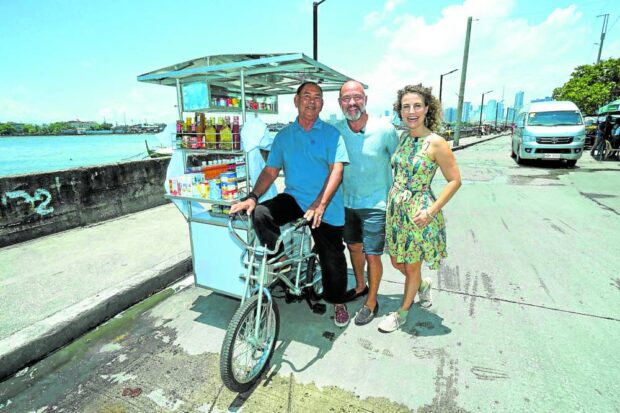Plastic Bank: Picking up the pieces for trash collectors

‘REALLY THANKFUL’ |Reynaldo Balingit (left) is shown at the pedal of the fishball cart donated by David Katz (middle) and his chief relations officer Taylor Leigh Cannizzaro. (Photo courtesy of PLASTIC BANK)
MANILA, Philippines — Unable to finish school and forced to work at an early age, Reynaldo Balingit has been collecting trash for a living. Now at 40, he supports his wife and his five children who are all married.
Balingit had collected a total of 1,279 kilograms of plastic waste since March when he became a registered member of Plastic Bank — a Canada-based social enterprise aimed at redefining garbage collection as a dignified source of income.
His monthly average collection of 255.8 kg of plastic waste was converted into cash and on Aug. 15, he was not only paid the cash equivalent of that trash volume but was also given an additional “incentive” pay and a fishball cart which Plastic Bank said was his alternative source of income and “a path out of poverty.”
Balingit cried with relief as Plastic Bank founder and chair David Katz, accompanied by his chief relations officer, Taylor Leigh Cannizzaro, handed over the cart to Balingit during his visit to the Philippines in August.
“I’m really thankful. My wife takes medication and I have an in-law going through dialysis. We really need this,” Balingit said.
‘Banking for the poor’
Interviewed by reporters on Aug. 16 after he inspected Plastic Bank’s projects in the Manila district of Tondo, Payatas in Quezon City, and Rodriguez town in Rizal province, Katz said his enterprise does “banking for the poor,” using an app through which plastics and other scrap materials serve as the currency for registered waste collectors and junk shops.
“Junk shops pay very little. So here we are. We give the pay and then we can give a bonus on top,” Katz said, referring to the incentive pay.
Plastic Bank said its registered garbage collectors can earn around P10,000 a month. Plastic Bank’s Philippine operation, which is based in Luzon for now, has already registered around 8,000 collectors and more than 200 junk shops.
To become a member, one only needs to download the Plastic Bank app. Collectors who cannot yet be registered because they don’t have mobile phones could bring their scraps to registered junk shops, which can record the transaction.
Camille Nunez, marketing manager of Plastic Bank Philippines, said the benefit of a garbage collector joining Plastic Bank is that “they earn incentives on top of the market price that they receive from the junk shop.”
“Usually [the incentive pay] averages at around P8 to P15 [per kilo],” she said. “And if you’re a member of Plastic Bank, it could be times two.”
Given the health risks involved in garbage collection, collectors are also provided with health benefits, particularly accident insurance in case of emergencies, Nunez said.
‘Social impact’
Another benefit of becoming a Plastic Bank member, Katz said, is that garbage collectors and junk shops become more adept and knowledgeable in electronic banking.
“It’s part of our social impact program to provide them these kinds of training, not just about the environment, not just about teaching them about high recyclability of materials, but also to empower them to become savings owners,” he said.
Plastic Bank conducts an ecosystem mapping in different areas to evaluate junk shops that wish to be registered, assessing their technological capacity as they use the app.
Plastic and other waste materials collected by the junk shops will then be classified, then transported to “affiliated Plastic Bank processors,” Katz said.
“These affiliated processors will again clean these materials and [convert them into] a new kind of plastic material,” he said, explaining how the waste is repurposed as yarns and other packaging materials.
Producers’ responsibility
Plastic Bank said its programs complement the goal of the Department of Environment and Natural Resources to improve income sources among trash collectors and thus provide better lives.
Environment Secretary Maria Antonia Yulo Loyzaga had earlier advocated promoting their welfare, describing them as the “backbone” of garbage collection services in the country.
She also called for the implementation of such laws as Republic Act No. 11898, which aims to ensure “producers’ responsibility” in the management of plastic waste.
Katz said his enterprise could help the government meet the objectives of the law, also known as the Extended Producers Responsibility (EPR) Act of 2022, which requires companies with total assets of more than P1 billion to establish a recycling system on their plastic waste.
He said Plastic Bank’s database could monitor compliance among big businesses, and this could “prove exactly how much material they collected.”
“What we built is a technology for EPR schemes. So it allows the [business] putting out 10 million kg of plastic to participate in collecting that material back,” he said.
‘Material resource’
Katz emphasized that plastic waste should be regarded as a “material resource” among industries.
“Because when we keep calling it waste, no one wants to go get it. When I say it’s a resource, ‘Oh, resources, I can go get,’” he said.
Katz said Plastic Bank also wants to remove the stigma on people who are involved in recycling.
“It has been so stigmatized that if someone looks at you recycling, it’s like, ‘Oh, you must be poor,’” he said.